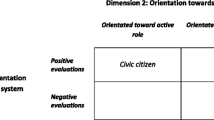Abstract
The aim of the paper is to explore the demographic, social, economic and politicaldeterminants of voting behavior in a recently held referendum on the constructionof a new theater (``Musiktheater'') in the city of Linz (Upper Austria) in 2000. Itwas the first referendum on cultural policy of its kind in Austria, and it led to arejection of the proposal by a majority of the voters (59.70% of ``No'' votes).Exploring the determinants of approval or disapproval of the proposition by usingfor group data in communities is thus an interesting question from an economic aswell as a political point of view. We find econometric evidence for the influence ofthe size of the population in the community, the distance of the community from thecity of Linz, income-related variables, variables denoting the economic structure ofthe community, and political variables such as the ratio of the communities' debt torevenues and voters' preferences in the last national election.
Similar content being viewed by others
References
Frey, B.S. (1997) 'The Evaluation of Cultural Heritage: Some Critical Issues', in M. Hutter and I. Rizzo, eds., Economic Perspectives on Cultural Heritage. New York: St. Martin's Press, pp. 31–49.
Frey, B.S. (2000) Arts and Economics: Analysis & Cultural Policy. Berlin: Springer Verlag.
Frey, B.S., and Pommerehne, W. (1993) 'Economics, Democracy and Arts: Love's Labor Lost?', Discussion paper B 9303, December 1993, Department of Economics, Saarbrücken: University of Saarland.
Getzner, M. (2002) 'Determinants of Public Cultural Expenditures: An Exploratory Time Series Analysis for Austria', Journal of Cultural Economics 26(4), 287–306.
Grampp, W.D. (1989) 'Rent-Seeking in Arts Policy', Public Choice 60(1), 113–121.
Khakee, A. (1988) 'The Rationale for Urban Government Action for Arts Funding', Journal of Cultural Economics 12(1), 1–18.
Krebs, S., and Pommerehne, W. (1995). 'Politico-Economic Interactions of German Public Performing Arts Institutions', Journal of Cultural Economics 19(1), 17–32.
Lingle, C. (1992) 'Public Choice and Public Funding of the Arts', in R Towse and A. Khakee, eds., Cultural Economics. Berlin: Springer-Verlag, pp. 21–30.
Netzer, D. (1992) 'Cultural Policy in an Era of Budgetary Stringency and Fiscal Decentralization: The US Experience', in R. Towse and A. Khakee, eds., Cultural Economics. Berlin: Springer Verlag, pp. 237–245.
Oberösterreichische Landesregierung (2000) Volksbefragung 2000-Musiktheater Linz. Informationen der Abteilung Statistik des Amtes der Oberösterreichischen Landesregierung, Folge 41/2000, Linz.
Peacock, A. (1994) 'The Design and Operation of Public Funding of the Arts: An Economist's View', in A. Peacock and I. Rizzo, eds., Cultural Economics and Cultural Policies. Dordrecht: Kluwer Academic Publishers, pp. 167–184.
Pindyck, R.S., and Rubinfeld, D.L. (1991) Econometric Models & Economic Forecasts. New York: McGraw-Hill.
Pommerehne, W. (1982) 'Steuern, Staatsausgaben und Stimmbürgerverhalten', Jahrbücher für Nationalökonomie und Statistik 197(5), 438–462.
Schneider, F., and Pommerehne, W. (1983) 'Private Demand for Public Subsidies to the Arts: A Study in Voting and Expenditure Theory', in W.S. Hendon and J.L. Shanahan, eds., Economics of Cultural Decisions. Cambridge, MA: Abt Books, pp. 192–206.
Schulze, G.G., and Rose, A. (1998) 'Public Orchestra Funding in Germany-An Empirical Investigation', Journal of Cultural Economics 22(3), 227–247.
Schulze, G.G., and Ursprung, H.W. (2000) 'La donna e mobile-or Is She? Voter Preferences and Public Support for the Performing Arts', Public Choice 102(1), 131–149.
Seaman, B.A. (1981) 'Economic Theory and the Positive Economics of Arts Financing', American Economic Review 71(2), 335–340.
Statistik Österreich (2001) Data excerpt of the ISIS databank. Statistik Österreich, Vienna.
Weck-Hannemann, H. (1990) 'Protectionism in Direct Democracy', Journal of Institutional and Theoretical Economics 146(3), 389–418.
Withers, G.A. (1979) 'Private Demand for Public Subsidies: An Econometric Study of Cultural Support in Australia', Journal of Cultural Economics 3(1), 53–64.
Author information
Authors and Affiliations
Rights and permissions
About this article
Cite this article
Getzner, M. Exploring Voter Preferences in Cultural Policy: A Case Study for Austria. Empirica 31, 27–42 (2004). https://doi.org/10.1023/B:EMPI.0000024029.82012.16
Issue Date:
DOI: https://doi.org/10.1023/B:EMPI.0000024029.82012.16



